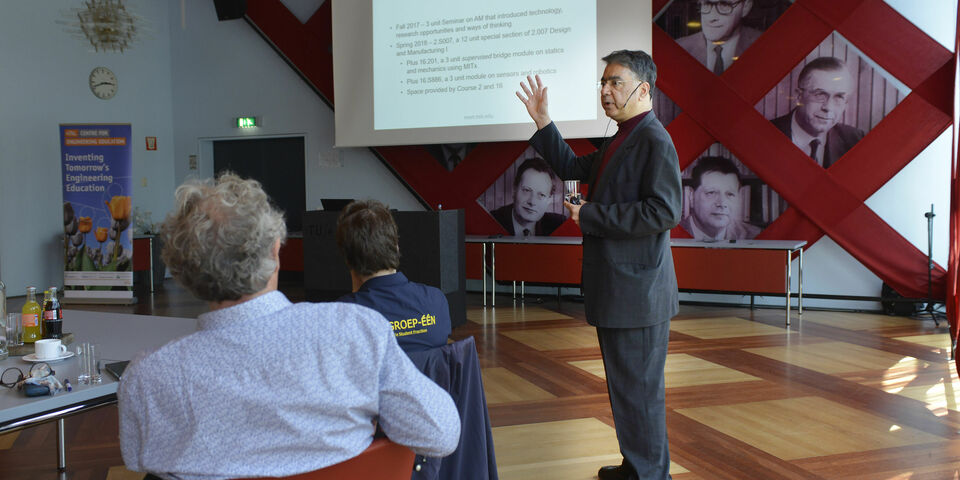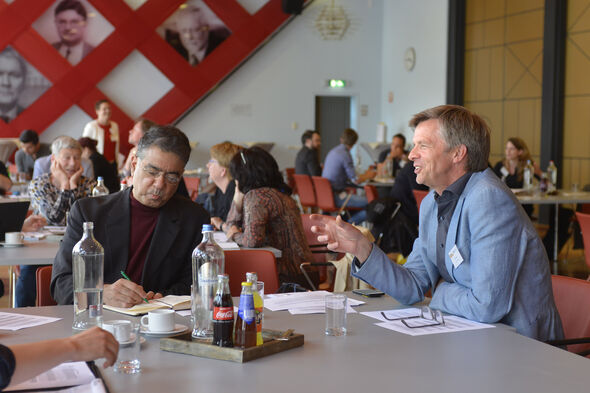The education of the future is already underway at MIT
How can you keep your students motivated? Not only now, but also in the future? It is a question occupying universities worldwide. At the prestigious MIT a very different form of education is now being piloted. Amitava Babi Mitra, the institute's director, talked about it yesterday at a session in the Auditorium. The audience members included various employees of the four Dutch technology universities. Lex Lemmens, Dean of the Bachelor College at TU/e, sees opportunities for our own future education.
“What keeps you awake at night?” Amitava Babi Mitra wants to know of his audience, which comprises mainly lecturers and policy officers. He draws a couple of hesitant answers. According to Mitra, director of New Engineering Education Transformation, it almost has to be that your students stop turning up and lose interest in your course. And that is precisely one of the reasons why the pilot program has been established. “We are high in the rankings, we attract enough students, so it's not something we have to do,” the MIT director says. So why? The answer from the audience, ‘because you want the best for the student,’ is right on target.
“The first year is for many students a disaster. They get bored and can't envisage the purpose for which they have to learn something.” With pictures of an aircraft and a drone, he shows how students are not yet learning about the new machines; they are still learning mostly about the ‘old’ ones. The pilot project that has been started (“I don't call it an experiment; that sounds so creepy”) is intended to help the students regain their enthusiasm, prevent dropout, and prepare them better for the future. The students, who can fit the project into their curriculum, learn, among other things, how to think more independently and critically. They also acquire knowledge about new machines and they work on certain cases in a project-based way that extends beyond the boundaries of their program. Think of making a robot from scratch, says Mitra by way of illustration. To date, the student experience has been positive and they are particularly enthusiastic about working with others and the amount of time being invested in them, according to the director. Greater flexibility and more projects are suggestions for improvement.
After the MIT director, representatives of the various Dutch technology universities speak about the educational vision at their institution. Interdisciplinary working and digitalization are the words that recur frequently. Lex Lemmens, Dean of the Bachelor College, outlines the ambition to have completely new education at TU/e in 2030. “And that will involve a greater change than when we moved to the Bachelor College,” he foresees. According to Lemmens, the aim must be for the engineers of the future to discover their talents and for there to be more work on problems like ‘How do you solve the climate problem?’ and ‘How can you reduce the cost of healthcare?’ and less work within disciplines. “We can see the dot on the horizon, but it might move about a bit. If we experiment, we should eventually reach that dot.”
Lemmens is charmed by the approach adopted by MIT and sees within it some possibilities for TU/e. “What's great about the pilot is that it is so adventurous and that they have set it up within the existing program. I am amazed that 11 percent of MIT students are already taking part. We can adopt those elements that we are good at. Think of designing in the field of photonics. Developing robots was a nice example that Mitra gave; we are already doing something similar here.”
At the end of the session, organized by 4TU Centre for Engineering Education, some time has been planned for debate. This reveals that it is not easy to teach students certain skills, and to do it in a measurable way. After all, how do you stimulate critical thinking, and how can you assess whether students are doing it? Everyone leaves the session with plenty of food for thought.



Discussion